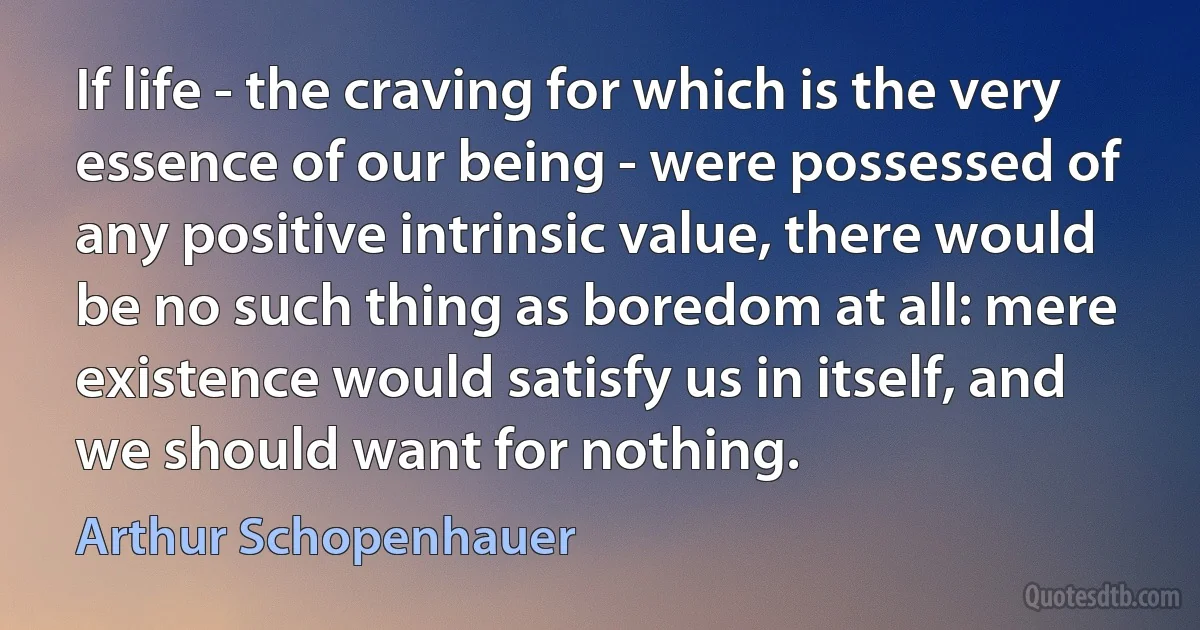Intrinsic Quotes - page 4
There has never been a time, until the last fifty years, when a majority of any population had regular and constant access to drama, and used this access. . . . It seems probable that in societies like Britain and the United States more drama is watched in a week or weekend, by the majority of viewers, than would have been watched in a year or in some cases a lifetime in any previous historical period. It is clearly one of the unique characteristics of advanced industrial societies that drama as an experience is now an intrinsic part of everyday life, at a quantitative level which is so very much greater than any precedent as to seem a fundamental qualitative change. Whatever the social and cultural reasons may finally be, it is clear that watching dramatic simulation of a wide range of experiences is now an essential part of our modern cultural pattern.

Raymond Williams
When it comes to labour market reform, here's the difference between us and John Howard: John Howard regards labour as just like any other economic commodity. We actually see labour as made up of human beings. These are human beings with an intrinsic dignity. When they go to the workplace, they're not just like a lump of wood or a piece of coal, these are human beings, and they should be treated properly as people with intrinsic rights.

Kevin Rudd
It is chiefly the psychologists of the school of Freud who have pointed out that many of man's thoughts and actions are compensatory substitutes for desires which he has been obliged to suppress. A thing may be desired not for its intrinsic worth or usefulness, but because he has unconsciously come to see in it a symbol of something else, the desire for which he is ashamed to admit to himself...This general principle, that men are very largely actuated by motives which they conceal from themselves, is as true of mass as of individual psychology...Human desires are the steam which makes the soial machine work. Only by understanding them can the propagandist control that cast, loose-jointed mechanism which is modern society.

Edward Bernays
It's at times like this, isn't it, when you realize just how much we need the United Nations - about as much as we need an ear infection...
Freedom of thought, freedom of speech, freedom of identity. This is my Holy Trinity, each one an intrinsic aspect of my god: Freedom, the Holiest of Holies. Yes it bloody well is. It is absolutely sacred and inviolable, beyond any negotiation or compromise, now and forever. Amen.

Pat Condell
The question becomes, I suppose, one of value. Knowing that the Vision's complete personality/memory/intelligence was downloaded into a computer in Titan (was it Titan? Memory blurs) allowed me to scrape his brain in my VisionQuest story, since everything could be restored with a literal flip of a switch. Should something that can be so easily copied and retrieved be treated as having the same intrinsic value as a human being? Should any of the human Avengers, for instance, ever risk their lives on behalf of the Vision? My vote would be no (as some of you have probably already guessed)-but I would say that even if it were not possible to restore or "save” the Vision in any other way. He is a "toaster.” (2006)

John Byrne
My father's moral inculcations were at all times mainly those of the "Socratici viri;" justice, temperance (to which he gave a very extended application), veracity, perseverance, readiness to encounter pain and especially labour; regard for the public good; estimation of persons according to their merits, and of things according to their intrinsic usefulness; a life of exertion in contradiction to one of self-indulgent sloth. These and other moralities he conveyed in brief sentences, uttered as occasion arose, of grave exhortation, or stern reprobation and contemp. But though direct moral teaching does much, indirect does more; and the effect my father produced on my character, did not depend solely on what he said or did with that direct object, but also, and still more, on what manner of man he was.

John Stuart Mill
Doing things like playing music, something that's so natural and basic to human function, running around in nature, eating delicious food. These things are intrinsic in basic, primordial to human beings, so that's sort of a way to return to a blank canvas, allowing my true personality to return.

Ezra Miller
The essential difference between that knowledge which is, and that which is not conclusive evidence of Christian character, lies in this: the object of the one is the agreement of the several parts of a theological proposition; the object of the other is moral beauty, the intrinsic loveliness of God and Divine things. The sinner sees and hates; the saint sees and loves.

Gardiner Spring
The immanent purpose is an intrinsic property of living beings, without it, they would not exist. Consider the autonomous function units and their components: organs, tissues, isolated cells, as well as other properties such as nutrition, body defense, growth, reproduction, to which they are subject at the end. When it comes to these properties, biologists do not argue; but if you pronounce the word purpose, there is a public outcry. Probably because they do not distinguish the purpose of fact or immanent, the trascendental purpose. Of the latter, the biologist has little or nothing to say; it is a matter of metaphysics.

Pierre-Paul Grassé
The validity of g is most conspicuous in scholastic performance, not because g-loaded tests measure specifically what is taught in school, but because g is intrinsic to learning novel material, grasping concepts, distinctions, and meanings... The most critical tool for scholastic learning beyond the primary grades- reading comprehension-is probably the most highly g-loaded attainment in the course of elementary education.

Arthur Jensen
Even after his conversion, the true 'apostate' is not primarily committed to the positive contents of his new belief and to the realization of its aims. He is motivated by the struggle against the old belief and lives on for its negation. The apostate does not affirm his new convictions for their own sake; he is engaged in a continuous chain of acts of revenge against his own spiritual past. In reality he remains a captive of this past, and the new faith is merely a handy frame of reference for negating and rejecting the old. As a religious type, the apostate is therefore at the opposite pole from the 'resurrected,' whose life is transformed by a new faith which is full of intrinsic meaning and value.

Max Scheler
In our time there are many artists who do something because it is new; they see their value and their justification in this newness. They are deceiving themselves; novelty is seldom the essential. This has to do with one thing only; making a subject better from its intrinsic nature.

Henri de Toulouse-Lautrec
[This view is contrasted with all forms of Empiricism, by which it is] assumed that development is uniform across (cognitive) domains, and that the intrinsic properties of the initial state (of the mind) are homogeneous and undifferentiated - an assumption found across a spectrum reaching from Skinner to Piaget.

Noam Chomsky
The whole science of heat is founded Thermometry and Calorimetry, and when these operations are understood we may proceed to the third step, which is the investigation of those relations between the thermal and the mechanical properties of substances which form the subject of Thermodynamics. The whole of this part of the subject depends on the consideration of the Intrinsic Energy of a system of bodies, as depending on the temperature and physical state, as well as the form, motion, and relative position of these bodies. Of this energy, however, only a part is available for the purpose of producing mechanical work, and though the energy itself is indestructible, the available part is liable to diminution by the action of certain natural processes, such as conduction and radiation of heat, friction, and viscosity. These processes, by which energy is rendered unavailable as a source of work, are classed together under the name of the Dissipation of Energy.

James Clerk Maxwell



